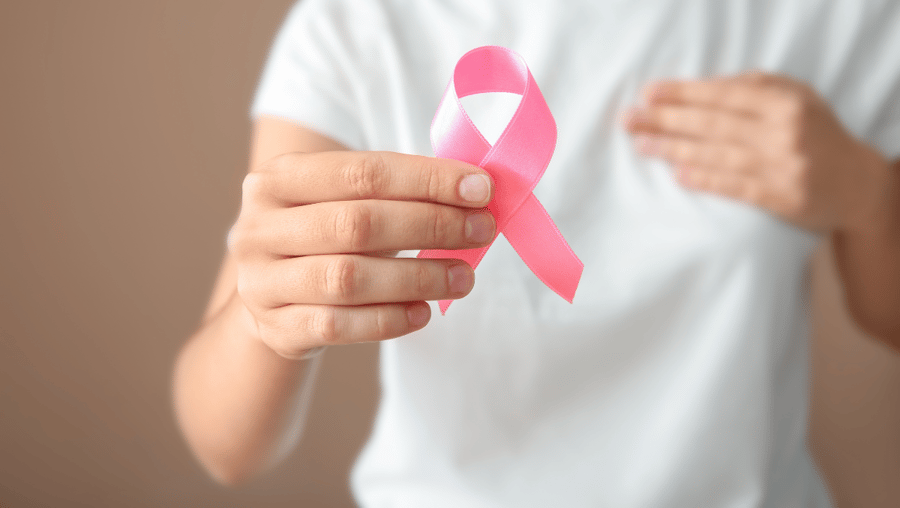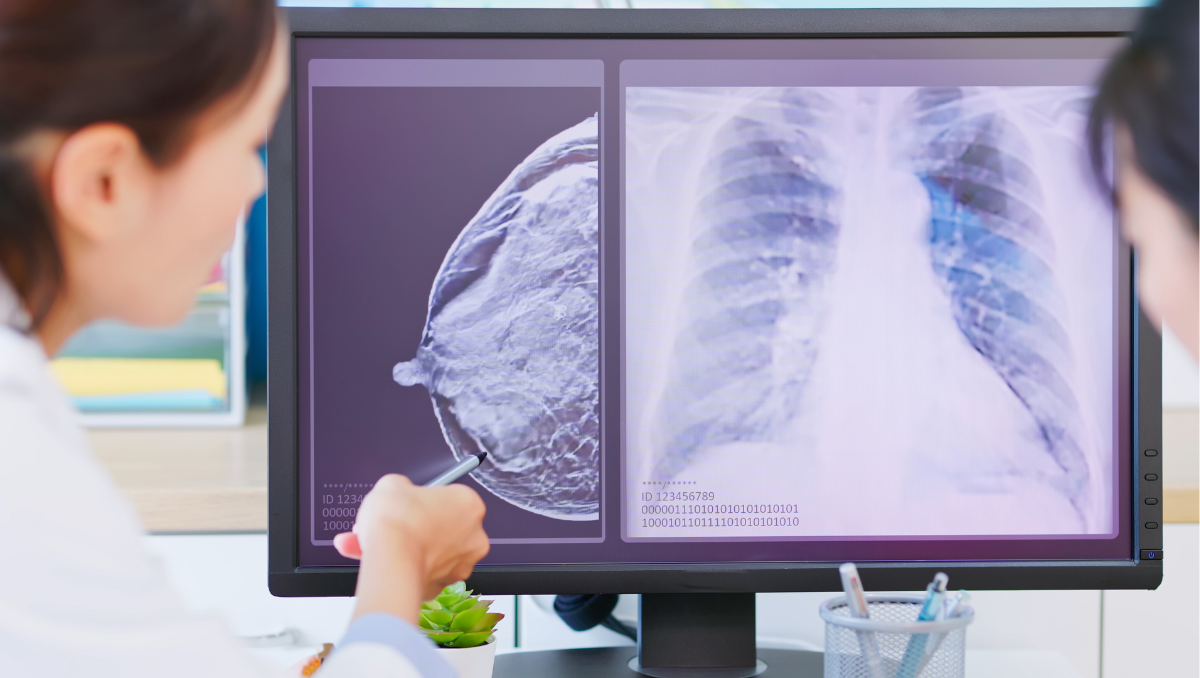AHW Health Research Grants Support Advancements in Breast Cancer Detection and Prevention
October 12, 2023 Posted by AHW Endowment

October is Breast Cancer Awareness Month, and a reminder of the importance of spreading awareness and encouraging education about the disease. Breast cancer is a critical health issue due to its prevalence, potential for mortality, and far-reaching impact. It’s among the most commonly diagnosed cancers worldwide and affects more than 240,000 people in the U.S. each year. Breast cancer takes a physical, emotional, and financial toll on patients and their families, and creates burdens on healthcare systems, economies, and communities.
Addressing breast cancer in Wisconsin through prevention, early detection, research, and support is important to decreasing its life-altering effects and improving the quality of life for those affected by the disease. The Advancing a Healthier Wisconsin Endowment (AHW) has awarded numerous health research grants in Wisconsin that support research to expand knowledge about breast cancer and advance diagnosis and treatment options.
Breast Cancer in Wisconsin
Breast cancer is the most common cancer among women of all races in Wisconsin. In 2022, an estimated 5,380 women were diagnosed with invasive breast cancer and an estimated 720 women died from the disease (18.5 per 100,000 women). The mortality rate for Black women is higher: 27.1 per 100,000 women in Wisconsin, and 27.6 per 100,000 women in the U.S.
Various hereditary and medical factors can put individuals at risk for developing breast cancer, including:
- Personal and family history of breast or ovarian cancer
- Inherited genetic mutations (ex. BRCA1 and BRCA2)
- Personal history of ductal or lobular carcinoma
- Some benign breast conditions
- High breast tissue density
- High-dose radiation to the chest in youth
- High bone mineral density
- Type 2 diabetes
Other risk factors that can be modified with changes to health and lifestyle include weight gain after age 18, use of menopausal combined hormone therapy, lack of physical activity, and alcohol consumption.
Breast Cancer Screening
While screening can’t prevent breast cancer, it can detect breast cancer early and provide better opportunities to treat it and potentially keep it from progressing. Currently, the United States Preventative Services Task Force (USPSTF) recommends that women ages 50-74 who are at an average risk for breast cancer schedule a mammogram (breast x-ray) every two years. According to USPSTF, women 40-49 should consult with their healthcare provider about when to start getting mammograms.
The Centers for Disease Control and Prevention states mammograms are “the best way to find breast cancer for most women of screening age,” while breast magnetic resonance imaging (MRI) is recommended for high-risk patients.
Additionally, it’s important to perform self-exams to maintain awareness of breast changes—such as size, lumps, or any pain—and to undergo clinical breast exams with a healthcare professional.
AHW Health Research Grants Investigating Breast Cancer
AHW invests in health research projects that aim to improve breast cancer screening, diagnoses, and treatment, and create better health outcomes for patients in Wisconsin and beyond. Here are several of the projects we have funded.
Assessing Breast Cancer Risk Prior to Gender—Affirming Chest Masculinization Surgery
Chest masculinization surgery is a gender-affirming surgery in which most of the breast tissue is removed in a person with the female sex assigned at birth, allowing the chest to appear masculine. In recent years, there has been a rise in gender-affirming surgeries, with an estimated 17,480 chest masculinization surgeries performed between 2016-2019.
A Medical College of Wisconsin (MCW) research team led by principal investigator Chandler Cortina, MD, MS, FSSO, FACS (Surgery), supported by a $50,000 AHW health research grant, is exploring how many transgender and nonbinary (TGNB) individuals with a high risk of breast cancer development undergo chest masculinization surgery. The year-long project began in January 2023, and researchers look forward to investigating what percentage of this at-risk population chooses to have risk-reducing mastectomies as part of their chest masculinization surgery and comparing self-perceived breast cancer risk with calculated risk.
With their project findings, researchers aim to generate information that can inform TGNB patients and their surgeons on the importance of personalized breast cancer risk assessment before chest masculinization surgery and the accuracy of self-perceived breast cancer risk in TGNB persons.

Mammographic Quality in Wisconsin's Breast Cancer Disparities
Mammograms are a valuable tool for identifying breast cancer early; their use reduces breast cancer mortality by 20%. However, for mammograms to be performed properly and generate accurate imaging, they require technical expertise and strong systems for quality screening and follow-up on abnormal tests.
In an effort to reduce breast cancer disparities in Wisconsin and build consistent mammographic quality across the state, MCW principal investigator Joan Neuner, MD, MPH (Medicine), is working with the Wisconsin Women’s Health Foundation to develop a sustainable shared measurement system to identify and track factors perpetuating breast cancer disparities.
The project began in 2021 and is supported by $2.1 million in AHW funding over five years. Its researchers have developed their team and communication systems for the project, identified key stakeholders to engage in regional learning collaboratives, and conducted a scan of mammogram sites in southeast Wisconsin.
Study of Pre-Analytical Effects on Breast Cancer Biomarkers
Many breast cancer operations are now available as outpatient procedures, which don’t need to be performed in a primary hospital and can instead be done at ambulatory surgery centers or community hospitals. While the ability to schedule these procedures outside of primary hospitals presents benefits, such as optimizing surgical resource utilization, it can create delays in transporting and processing specimens collected during the procedures. Such delays might negatively impact breast cancer biomarker expression, which is crucial information that providers and patients alike reference when considering therapy options.
With a $50,000 health research grant from AHW, MCW principal investigator Julie Jorns, MD (Pathology), and co-investigators Chandler Cortina, MD (Surgery), and Adrienne Cobb, MD (Surgery), are studying practical alternatives to on-site breast cancer specimen processing, including refrigeration and freezing.
With their findings from this year-long project, which kicked off in January 2023, the researchers hope to improve equitable breast care for all patients in Wisconsin, regardless of location or surgery setting, an especially important goal for the state’s rural population. This project may also inform the expansion of national clinical guidelines in breast cancer surgical specimen processing.
Improving Breast Cancer Outcomes
Ongoing advancements in breast cancer research, including current and future projects funded by AHW, are paving the way for a future where breast cancer is not only better understood, but also more effectively treated and ultimately prevented.
To learn more about all of our funded projects, click here.



